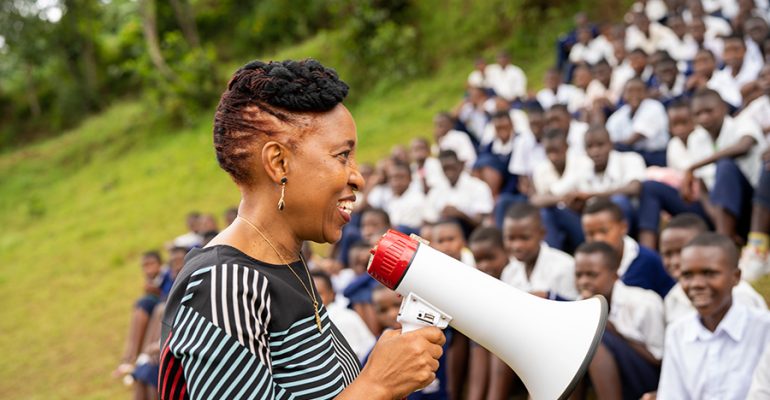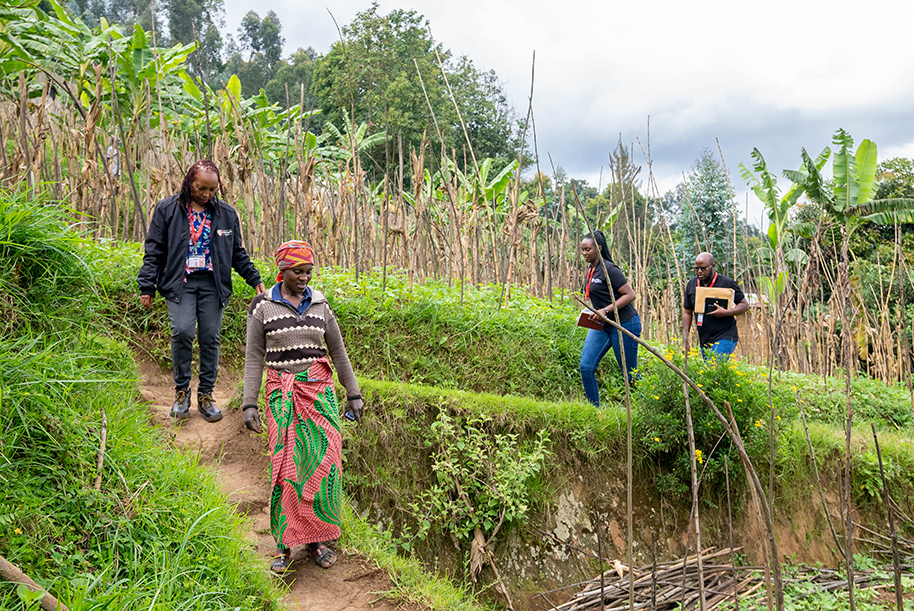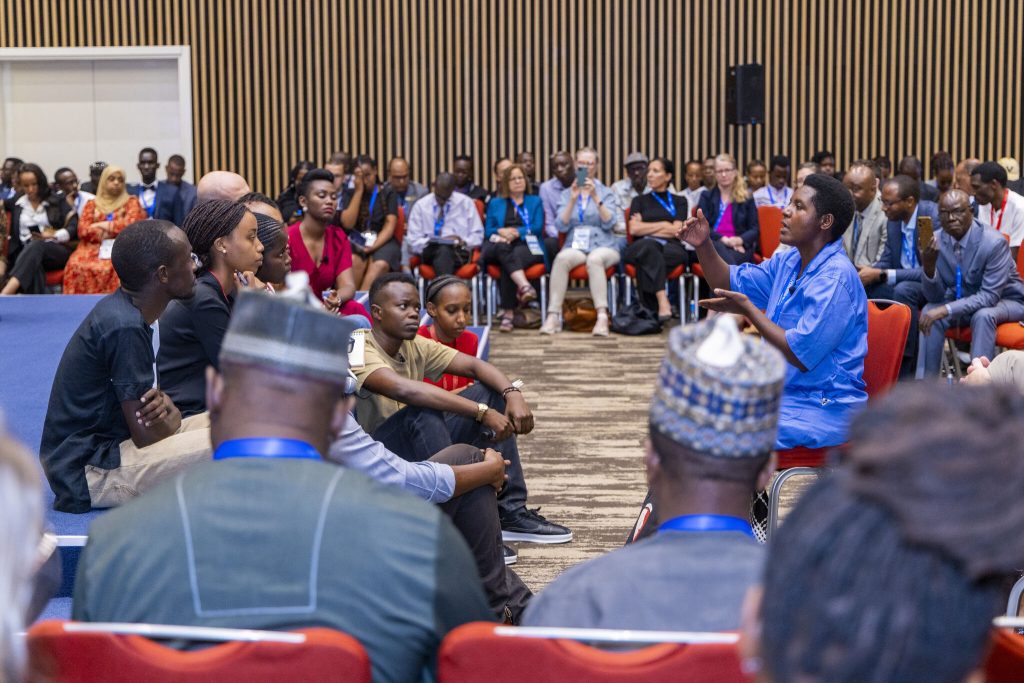The Essence of Giving Back: Definition by Dr. Florence Akiiki Bitalabeho
June 25, 2025 2025-06-27 6:21The Essence of Giving Back: Definition by Dr. Florence Akiiki Bitalabeho

The Essence of Giving Back: Definition by Dr. Florence Akiiki Bitalabeho
Dr. Akiiki’s smile widens whenever she hears the phrase “giving back.” For her, it is not just a charity saying from afar, but a daily practice rooted in community, humility, and accountability. Born and raised on the green hills of western Uganda, shaped by years of clinical work in South Africa, Geneva and now Rwanda, she has come to see every border crossing as an invitation to serve. Dr. Akiiki believes communities shaped her, and she should, in return, serve. “I am a product of other people. I am not an island… what I do and who I am is because of the collective.” She says.
“If you want to heal people, it takes more than one’s profession, and it starts by listening.”
The seeds of service inside her were planted when she was a newly graduate, venturing into Ugandan villages that most physicians ignored. Later, in South Africa during the height of the HIV epidemic, she witnessed the gap between urban hospitals and rural realities. Those contrasts shaped her urge to help rewrite medical curricula, first in Johannesburg, then for the WHO in Geneva, and now for the University of Global Health Equity, always bringing learners closer to the communities they serve. “If you want to heal people, it takes more than one profession, and it starts by listening.” Dr. Akiiki notes.
That philosophy colors every class she teaches at the UGHE, in rural northern Rwanda, Butaro. The first day of class, she leads students outside the campus gate and points to the terraced hills where local farmers families once lived. “Remember why we are here,” she tells them, reminding each student that the land they learn on was offered, at great personal cost by the surrounding community. “The community, through the government of Rwanda, has given a lot for us to be on the top of that hill (Butaro). Working with them (community) is the least we can do.” Dr. Akiiki with a gratitude voice.
The sturdy, beautifully crafted walls of the Butaro buildings provide a cool and refreshing atmosphere. But, Dr. Akiiki’s favorite classroom has no walls and no roof. She leads learners down muddy paths, through fields, and into village health posts where community health workers greet them by name. These walks are not field trips; they are part of the curriculum; they are the curriculum.

“I give back by teaching students to understand why we give back […] We study not for ourselves, but for the communities we come from.”
Dr. Akiiki teaches students why giving back is important, and that they study not for themselves, but for the communities they come from. She finds it rewarding to see UGHE students addressing important community issues, especially those linked to social determinants of health. These include starting after-school mentorships in local schools, running science days in UGHE laboratories, and even collaborating to make reusable menstrual pads after discovering how lack of sanitation kept girls out of classes. A question sparks each project she poses on those walks: “What do you see, and how will you stand accountable for it?”
In what she calls ‘walking the patient’s road’, even when rain clouds gather over Butaro’s misty slopes, Dr. Akiiki pulls on her boots and invites a group of students to walk with her. They slip on the same red clay that patients navigate to reach the health center. By the time they return, shoes caked, and hearts humbled, every student understands the final lesson: giving back is not an act, it is a way of being in the world, one muddy step at a time. To her, opening a mouth and telling the community story, so the world can understand that it is essential to work with – never above – people, is giving back.
Dr. Akiiki remembers a recent medical education conference – MedEdAfrica, a bit different from others. She remembers bringing a community health worker and two patients – community members – to the main stage. Their testimony, raw and unscripted, shifted the entire tone of the conference. Breaking away from the usual approach to such gatherings, the community demonstrated their lived experiences, their journey to access care, and the daily partnerships they build with their community health workers.
Later, the health worker wrote that the experience had “given her confidence and strength.” Dr Akiiki counts that letter among her greatest achievements.

Dr. Akiiki believes in partnering with the community to give back. For her, partnership means reciprocity. When students, executive learners like Atlantic Fellows visit, they do not “assist” a community; they work alongside it. The community, in turn, validates and sharpens their skills. “Our partnerships are respectful and reciprocal… Community health workers feel validated that a university would partner with them.” Dr. Akiiki emphasizes.
Sometimes reciprocity looks like data. Students collect quality-improvement metrics for rural clinics. Sometimes it is as simple as presence, sitting beside a farmer as they explain how far they must travel for post-surgery care. Every encounter feeds back into research proposals, policy briefs, and conference keynotes that amplify local voices on global stages.
“The work fuels me […] I’m living my dream. Our classrooms are out in the community, and that refuels me every day.”
Dr. Akiiki likes her routine; driving the Northern Rwanda’s red dirt roads: the climbs are steep, the rains unpredictable, but every descent offers a renewal of her perspective. Her team’s shared enthusiasm is her constant refilling. “The work fuels me! I’m living my dream. Our classrooms are out in the community, and that refuels me every day.” She says.
Today, standing in post-genocide Rwanda, “a nation that rose from ashes”, Dr. Akiiki feels both privilege and duty. She feels the responsibility of carrying on the legacy of Dr. Paul Farmer and the vision of UGHE. Thus, each time she tells her students: “From day one, you are leaders.”
“The Essence of Giving Back” is a blog series that explores both the big and small ways our community is making a difference. At UGHE, we believe giving back is more than a charitable act, it is a philosophy of service, empathy, and responsibility. It involves contributing time, effort, or resources to a cause or community without the expectation of personal gain. Giving back is about creating a positive impact and uplifting others, often through small, intentional acts of kindness and support. Stay tuned for the following episodes.








Comments (4)
temp-mail
I just like the helpful information you provide in your articles
Yalova magazin
Nice post. I learn something totally new and challenging on websites
İstanbul barlar sokağı
You’re so awesome! I don’t believe I have read a single thing like that before. So great to find someone with some original thoughts on this topic. Really.. thank you for starting this up. This website is something that is needed on the internet, someone with a little originality!
escort Adana
Great information shared.. really enjoyed reading this post thank you author for sharing this post .. appreciated